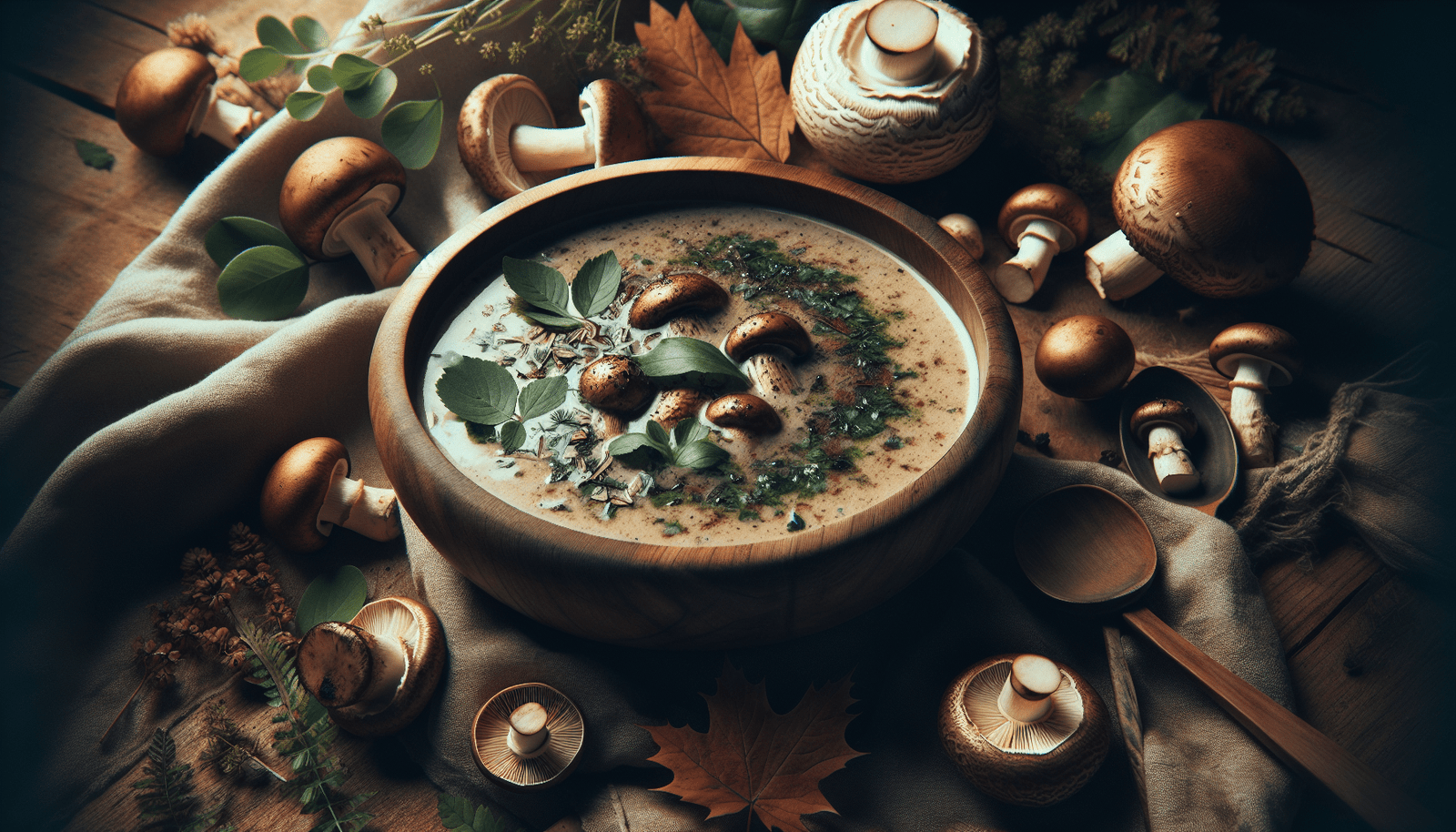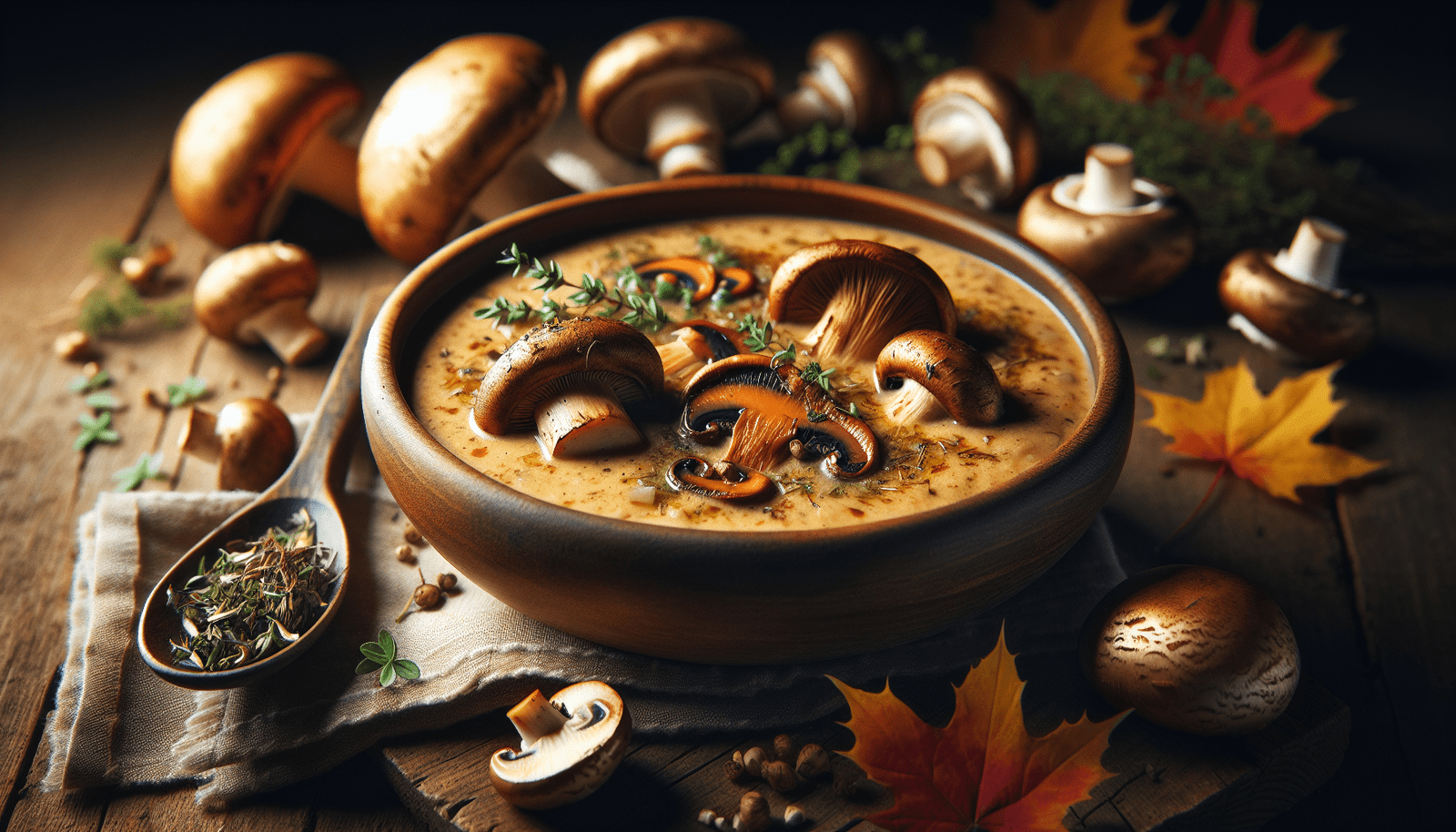Have you ever wondered what makes wild mushroom soups and stews such an enduring comfort food? Whether it’s the rich, earthy flavors or the comforting warmth on a chilly day, wild mushroom soups and stews have a special place in our hearts. This article will guide you through the intricacies of using wild mushrooms in your soups and stews, and provide valuable tips, techniques, and recipes to bring comfort in a bowl to your dining table.

Understanding Wild Mushrooms
Before diving into recipes, it’s crucial to understand the different types of wild mushrooms, their unique flavors, textures, and nutritional profiles. Knowing this can help you make informed choices when preparing your soups and stews.
Types of Wild Mushrooms
Wild mushrooms come in numerous varieties, each with its own distinct flavor and texture. Here are some popular types:
| Mushroom Type | Flavor | Texture | Best Uses |
|---|---|---|---|
| Morels | Earthy, nutty | Spongy | Soups, stews, sautéed dishes |
| Porcini | Deep, earthy, slightly nutty | Firm and meaty | Stews, risottos, broths |
| Chanterelles | Fruity, slightly peppery | Delicate and smooth | Creamy soups, sautéed with butter |
| Hen of the Woods | Earthy, meaty | Firm and chewy | Stews, braises |
| Shiitake | Rich, umami | Slightly crunchy | Broths, soups, stir-fries |
| Oyster | Mild, slightly sweet | Soft | Soups, stews, grilled |
Nutritional Benefits
Wild mushrooms are packed with essential nutrients. They’re rich in vitamins B and D, antioxidants, and minerals like selenium, potassium, and zinc. Mushrooms are also a great source of dietary fiber and offer a high-quality plant-based protein.
Selecting and Preparing Wild Mushrooms
Selecting the right mushrooms and preparing them correctly is pivotal to enhancing the flavors and textures of your soups and stews.
How to Select Wild Mushrooms
When purchasing wild mushrooms:
- Look for Freshness: Choose mushrooms that are firm, dry, and free of blemishes.
- Smell Them: They should have a fresh, earthy scent without any sour or ammonia-like odors.
- Consider Seasonality: Some mushroom varieties are only available during specific seasons, which can affect their flavor and availability.
Cleaning Your Mushrooms
Unlike cultivated mushrooms, wild mushrooms can have more dirt and debris. Here’s how to clean them:
- Brush off Dirt: Use a soft brush or damp cloth to wipe away dirt.
- Rinse Sparingly: If you must rinse, do it quickly under cold water to avoid waterlogging.
- Dry Thoroughly: Pat them dry with a paper towel immediately after rinsing.
Cooking Techniques for Maximizing Flavor
To truly unlock the potential of wild mushrooms, it’s essential to use the right cooking techniques.
Sautéing
Sautéing mushrooms before adding them to soups and stews enhances their natural flavors through the Maillard reaction (browning process).
Steps:
- Heat some oil or butter in a pan.
- Add the mushrooms without overcrowding.
- Cook over medium-high heat until golden brown.
Making Mushroom Broth
A good mushroom broth can be the heart of your soup or stew, adding a deep umami flavor.
Basic Mushroom Broth Recipe:
- 2 cups chopped wild mushrooms
- 1 onion, roughly chopped
- 2 garlic cloves, crushed
- 1 carrot, chopped
- Fresh herbs (like thyme, parsley)
- 8 cups of water
Steps:
- In a large pot, sauté the mushrooms, onion, and garlic until fragrant.
- Add the carrot, herbs, and water.
- Bring to a boil, then simmer for at least an hour.
- Strain through a fine-mesh sieve.
Slow Cooking
Slow cooking allows flavors to meld together, making it ideal for hearty stews.
Steps:
- Sauté your mushrooms and any other aromatics first.
- Add all your ingredients to a slow cooker.
- Cook on low for 6-8 hours.
Recipe Inspirations
Here are some ways you can incorporate wild mushrooms into delicious, comforting soups and stews.
Classic Wild Mushroom Soup
This recipe is a perfect starting point if you want to explore the essence of wild mushrooms.
Ingredients:
- 4 cups mixed wild mushrooms, sliced
- 1 onion, finely chopped
- 2 cloves garlic, minced
- 4 cups mushroom broth
- 1 cup heavy cream
- 2 tbsp butter
- Salt and pepper to taste
- Fresh parsley for garnish
Steps:
- In a large pot, heat the butter and sauté the onions and garlic until soft.
- Add the mushrooms and cook until they start to release their moisture.
- Pour in the mushroom broth and bring to a boil, then reduce to a simmer for 20 minutes.
- Stir in the heavy cream and cook for another 5 minutes.
- Season with salt and pepper.
- Garnish with fresh parsley before serving.
Hearty Wild Mushroom Stew
For a more filling option, try this hearty and flavorful stew.
Ingredients:
- 5 cups mixed wild mushrooms, roughly chopped
- 1 large potato, diced
- 2 carrots, chopped
- 1 onion, chopped
- 2 cloves garlic, minced
- 4 cups mushroom broth
- 2 cups vegetable broth
- 1 cup barley
- 2 tbsp olive oil
- Fresh thyme and rosemary
- Salt and pepper to taste
Steps:
- Heat olive oil in a large pot and sauté the onions and garlic until softened.
- Add the mushrooms, potatoes, and carrots, cooking until they begin to soften.
- Stir in the barley.
- Pour in the mushroom and vegetable broth.
- Add fresh thyme and rosemary.
- Bring to a boil, then reduce to a simmer for 45 minutes or until the barley is tender.
- Season with salt and pepper.
Vegan Wild Mushroom and Lentil Stew
For a vegan twist, this wild mushroom and lentil stew is rich in flavor and nutrients.
Ingredients:
- 4 cups mixed wild mushrooms, sliced
- 1 cup green lentils, rinsed
- 1 onion, finely chopped
- 3 cloves garlic, minced
- 3 celery stalks, chopped
- 2 carrots, chopped
- 4 cups vegetable broth
- 2 cups mushroom broth
- 2 tbsp olive oil
- Fresh thyme
- 1 bay leaf
- Salt and pepper to taste
Steps:
- Heat olive oil in a large pot and sauté the onion, garlic, celery, and carrots until softened.
- Add the mushrooms and cook until they release their juices.
- Stir in the lentils.
- Pour in the vegetable and mushroom broth.
- Add fresh thyme and a bay leaf.
- Bring to a boil, then reduce to a simmer for 30-35 minutes or until lentils are tender.
- Season with salt and pepper.

Bringing It All Together: Tips and Techniques
Cooking with wild mushrooms doesn’t have to be daunting. Here are some more tips to ensure your soups and stews are always a hit.
Balancing Flavors
Wild mushrooms bring a distinct umami flavor, but you’ll want to balance this with other flavor profiles.
- Acidity: A splash of vinegar or a squeeze of lemon juice can brighten a dish.
- Sweetness: Carrots, sweet onions, and butternut squash can add a subtle sweetness.
- Heat: Chili flakes or a touch of cayenne can provide a nice contrast.
Thickening Your Soups and Stews
There are several ways to achieve the desired consistency for your soups and stews:
- Roux: Equal parts fat (butter) and flour cooked together, then added to the liquid.
- Pureeing: Blend a portion of your soup or stew and return it to the pot.
- Potatoes: Adding potatoes can naturally thicken as they break down while cooking.
Adding Fresh Herbs
Fresh herbs can elevate your soup or stew to another level. Consider the following combinations:
- Thyme and Parsley: Adds a subtle earthiness.
- Rosemary and Sage: Pairs well with the strong flavors of wild mushrooms.
- Dill and Chives: Offers a fresh, light note to balance the richness.
Health Benefits of Including Wild Mushrooms in Your Diet
Beyond taste, wild mushrooms offer a plethora of health benefits, making them a valuable addition to your diet.
Immune System Support
Many wild mushrooms, such as shiitake and maitake, contain beta-glucans, which have been shown to boost immune function.
Rich in Antioxidants
Mushrooms like reishi are rich in antioxidants, which can help combat oxidative stress and reduce inflammation.
High in Vitamins and Minerals
Wild mushrooms are a great source of essential vitamins and minerals, including:
- Vitamin D: Important for bone health and immune function.
- B Vitamins: Essential for energy production and brain function.
- Selenium: A powerful antioxidant.
Plant-Based Protein
Wild mushrooms offer a high-quality plant-based protein, making them ideal for vegetarians and vegans looking to add more protein to their diet.
Sustainability and Foraging: Ethical Practices
For those interested in foraging for wild mushrooms, it’s essential to do so sustainably and ethically.
Foraging Tips
- Know Your Mushrooms: Proper identification is crucial. Use a good field guide.
- Respect the Environment: Only take what you need and avoid damaging mycelium.
- Check Local Laws: Ensure you’re aware of local foraging regulations.
Cultivating Your Own Mushrooms
If foraging isn’t an option, cultivating mushrooms at home is a viable alternative.
- Choose the Right Kit: Many suppliers offer kits for growing mushrooms like shiitake, oyster, and lion’s mane.
- Follow Instructions Carefully: Each type of mushroom has specific requirements for light, humidity, and temperature.
Engaging with the Mushroom Community
Engage with other mushroom enthusiasts to expand your knowledge and share experiences. Online forums, local classes, and foraging groups are excellent places to start.
Sharing Recipes and Tips
Consider sharing your favorite recipes and cooking techniques with online communities. Not only will you find inspiration, but you’ll also contribute to a growing body of collective knowledge.
Conclusion
Wild mushroom soups and stews offer an unrivaled blend of rich flavors, comforting warmth, and essential nutrients. With the right selection, preparation, and cooking techniques, you can create delectable dishes that provide comfort in a bowl. Embrace these tips and recipes to bring wild mushrooms into your culinary adventures and experience the many joys they offer. From novice cooks to seasoned chefs, the versatility and richness of wild mushrooms await to elevate your next meal.
